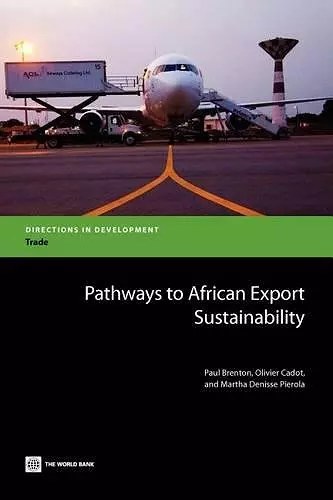Pathways to African Export Sustainability
Paul Brenton author Olivier Cadot author Martha Denisse Pierola author
Format:Paperback
Publisher:World Bank Publications
Published:17th Jul '12
Currently unavailable, and unfortunately no date known when it will be back

African exporters suffer from low survival rates on international markets. They fail more often than others, incurring time and again the setup costs involved in starting new relationships. This high churning is a source of waste, uncertainty, and discouragement. However, this trend is not inevitable. The high “infant mortality” of African exports is largely explained by Africa’s low-income business environment and, once properly benchmarked, Africa’s performance in terms of exporter failure is no outlier. Moreover, African exporters show vigorous entrepreneurship, with high entry rates into new products and markets despite formidable hurdles created by poor infrastructure, landlocked boundaries for some, and limited access to major sea routes for others. African exporters experiment a lot, and they frequently pay the price of failure. What matters for policy is how to ensure that viable ventures survive. Research carried out for this book demonstrates that governments can and should help to reduce the rate of failure of African export ventures through a mixture of improvements in the business environment, as well as well-targeted proactive interventions. The business environment can be made more conducive to sustainable export entrepreneurship through traditional policy prescriptions such as reducing transportation costs, facilitating trade through better technology and workflow in border management, improving the effectiveness of banking regulations to ensure the availability of trade finance, and striving for regulatory simplicity and coherence. In addition, governments can help leverage synergies between exporters. Original research featured in this book shows that African exporters improve each other's chances of survival when a critical mass of them penetrates a given market together. They also benefit from diaspora presence in destination markets. With adequate donor support and private-sector engagement, export-promotion agencies and technical-assistance programs can help leverage those synergies.|African exporters suffer from low survival rates on international markets. They fail more often than others, incurring time and again the setup costs involved in starting new relationships. This high churning is a source of waste, uncertainty, and discouragement. However, this volume shows that this is not inevitable. The high “infant mortality” of African exports is largely explained by the difficulty of Africa’s low-income business environment—once properly benchmarked, Africa’s performance in terms of exporter failure is no outlier. Moreover, as in other low-income countries, African exporters show vigorous entrepreneurship, with high...
"This collection deals with one of the most important problems of the contemporary world, with some of the problems generated by the neoliberal market-fundamentalist. It is one of the best collections of discourses on this problematic." --Prof. S.N. Eisenstadt, The Jerusalem Van Leer Institute "The editors compiled a volume that delves into the foundations of normative behavior by exploring the specific contribution of morality, thus going beyond the existing sociological literature on the role played by the norms in facilitating exchange and reinforcing group behavior. There are a number of valuable contributions not mentioned above, and scholars from many disciplines will benefit from the essays presented in this volume." --Canadian Journal of Sociology
ISBN: 9780821395592
Dimensions: unknown
Weight: 333g
130 pages